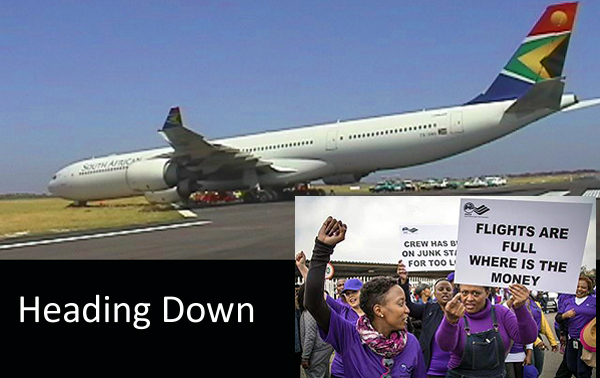 Once the darling of Africa, South African Airways is on the verge of collapse. Unless the South African government bails it out to the tune of 21 billion rand ($1½ billion) it will cease to exist within the next year.
Once the darling of Africa, South African Airways is on the verge of collapse. Unless the South African government bails it out to the tune of 21 billion rand ($1½ billion) it will cease to exist within the next year.
Here’s why:
Corruption initially driven by white manager racism, corruption continued under Jacob Zuma and really bad management. Those are the three main reasons and they are all good reasons for us as consumers abandoning SAA.
There’s a fourth, too: consumer reviews. Current reviews of SAA place it among the most disliked airlines on earth:
“South African Airways is far worse than incompetent,” writes a flyer from Arkansas on the Consumer Affairs website. That review is consistent with almost all of the 77 reviews listed on that basically impartial review organization.
Consumer Affairs gives SAA a 1- in 5-star rating.
And there’s even a fifth: prices. Lacking any motivation from employees who must see the writing on the wall, there has been no decent marketing for a number of years.
What does that mean? The airline continues to nurture sales through consolidators rather than directly with the consumer as all the rest of the airlines in the world are doing, today.
Consolidators are agents who receive handsome commissions on discounted fares. So if you were to shop out consolidator pricing (such as Priceline or actual travel agents in mostly metropolitan areas) you could get a competitive price with SAA. But consolidation carries its own burden of problems, the most serious of which are far fewer options should your ticket have to be changed, or even if your flight is canceled because of weather or mechanical difficulties.
So the cost of direct purchase of SAA tickets today is generally 20-25% higher than its main competitor, Delta, and that for in-flight service that continues to sink.
Back to racism. I remember with bitter distaste my many meetings with white South African Airlines’ managers prior to the end of apartheid. At the time only SAA flew directly between North America and South Africa, so there wasn’t much choice in doing business with them.
But I was also involved in other marketing and media businesses that gave us entry into the upper echelons of management. Lunches and meetings with those guys were horrible: one racist joke after another.
That ended when Mandela took over, but the culture which had trickled down the entire management and into the aircraft took much longer. I think they were doing pretty well when Jacob Zuma came onto the scene a decade ago.
Zuma’s nine years as president of the country were filled with all sorts of corruption, much of it tied to state parastatals like South African Airways.
Business Insider and Bloomberg, for instance, report that SAA routinely paid 30-40% more for maintenance than airlines of a similar size. The current South African government is only now undertaking a real audit to figure out where all that excess went.
Shortly after Zuma was virtually impeached in February the new South African government began actively seeking outside partners. Emirates seemed interested, but after just a few months of investigation Emirates pulled out of any possible deal. No one is left.
It doesn’t take much due diligence for any consumer to decide not to fly South African Airways: the prices are usually higher, the reliability in the cabin and for scheduling is sinking, and the reviews simply can’t get worse.
So I don’t think I need to make my recommendation: don’t fly SAA. But there can hardly be a more public blow to a country’s psyche than ditching its flagship airline, particularly one that once upon a time had a fabulous reputation. The ramifications for the rest of the economy and other long-term foreign investors could be quite serious.